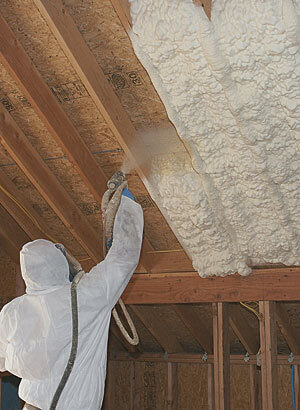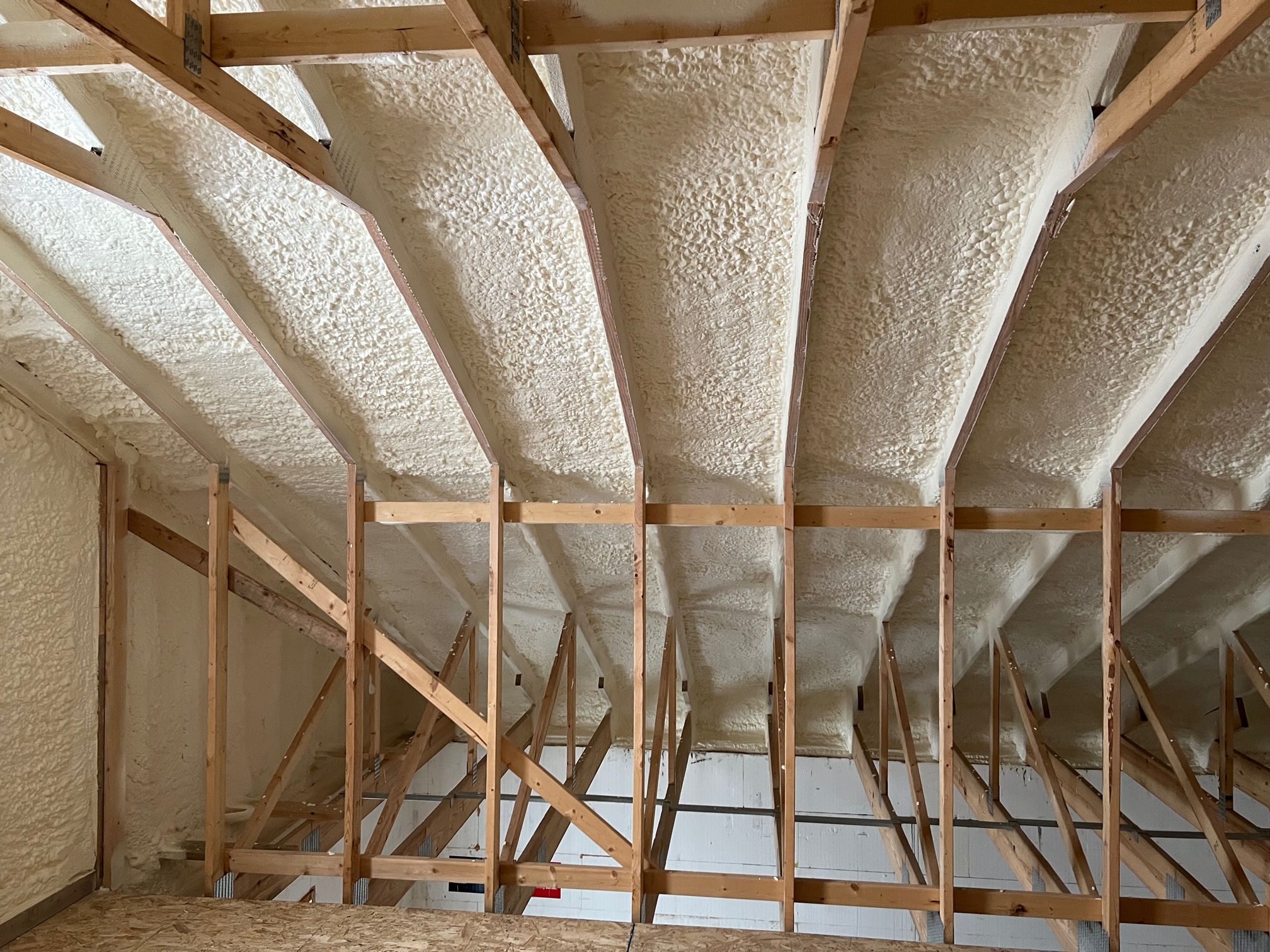How Spray Foam Can Boost Power Effectiveness in Your Home
How Spray Foam Can Boost Power Effectiveness in Your Home
Blog Article
Spray Foam: The Ultimate Solution for Air Sealing and Insulation
Spray foam insulation has become a leading service for efficient air sealing and thermal insulation, using an one-of-a-kind mix of residential or commercial properties that set it besides typical approaches. Its capacity to increase and load voids makes it specifically reliable in protecting against air leak, which can dramatically influence power effectiveness. Nevertheless, comprehending the full scope of its advantages, installment procedures, and comparisons with other insulation kinds is crucial for making educated choices. As we discover these elements, the implications for both brand-new buildings and retrofits end up being increasingly substantial. What elements should affect your choice?
What Is Spray Foam?
Spray foam is a flexible insulation product that integrates the concepts of air sealing and thermal resistance to improve power effectiveness in structures. Composed mostly of polyurethane or various other similar substances, spray foam is used as a liquid that broadens upon call with surfaces, producing a strong, continuous layer of insulation. This special property enables it to load voids, cracks, and spaces that traditional insulation products might overlook, offering a premium air seal.
There are 2 main kinds of spray foam: open-cell and closed-cell. Open-cell spray foam is lighter and extra adaptable, providing exceptional audio absorption and a reduced R-value per inch - Spray Foam. In contrast, closed-cell spray foam is denser, offering a higher R-value, wetness resistance, and included architectural honesty to constructing components
The application process usually includes customized tools, ensuring a smooth application that abides by various substratums, consisting of timber, concrete, and steel. This versatility makes spray foam ideal for both brand-new constructions and retrofitting existing structures. Its ability to create an airtight barrier considerably adds to decreasing energy consumption and improving interior air top quality, therefore making it a recommended selection among home owners and building contractors alike.
Advantages of Spray Foam Insulation
Among the most significant benefits of spray foam insulation is its phenomenal capability to produce a continuous air obstacle, which successfully reduces power loss. Unlike standard insulation materials, spray foam increases to fill up fractures and voids, making sure that air leakage is significantly lowered. This characteristic not just improves power effectiveness but likewise leads to reduce utility expenses over time.
Furthermore, spray foam insulation provides remarkable thermal resistance, adding to a much more stable indoor setting. Its high R-value per inch enables reliable insulation in confined areas, making it ideal for attics, wall surfaces, and crawl spaces. In addition, the moisture-resistant residential properties of spray foam help stop mold and mildew and mildew growth, advertising much healthier living conditions.
An additional crucial benefit of spray foam insulation is its sound-dampening top qualities (Spray Foam). It properly reduces noise transmission in between areas, developing a quieter and much more comfy home setting. The durability of spray foam also stands apart, as it does not droop or clear up with time, keeping its efficiency throughout its life-span
Just How Spray Foam Functions
Recognizing just how spray foam insulation functions is crucial for valuing use this link its performance in air securing and thermal resistance. Spray foam insulation includes two primary components: isocyanate and polyol resin. When these parts are combined, they undertake a chain reaction that triggers the material to expand rapidly, developing a thick foam that fills up fractures, gaps, and cavities.
As the foam broadens, it follows surface areas, developing a closed seal that significantly lowers air infiltration. This characteristic makes spray foam insulation very efficient at preventing drafts and dampness penetration, which can lead to power loss and damage with time. In addition, the closed-cell variant of spray foam supplies remarkable thermal resistance due to its inflexible structure, effectively lessening heat transfer.
The special residential properties of spray foam allow it to adjust to irregular surface areas, ensuring thorough coverage and a smooth barrier. Because of this, spray foam insulation not just enhances power performance however additionally adds to boosted interior air high quality by lowering the accumulation of pollutants and irritants. Inevitably, understanding the auto mechanics behind spray foam emphasizes its role as an exceptional option for insulation and air securing in both business and household applications.
Setup Process Overview

Prior to installation, the space needs to be appropriately cleaned and prepped, guaranteeing that surface areas are cost-free from wetness, debris, and dust. This step is important since pollutants can jeopardize bond and general efficiency. Once the area is prepared, the application entails blending both elements of the spray foam, which broadens upon get in touch with and fills up gaps effectively.
Trained specialists need to perform the installment, using specialized equipment to ensure consistent insurance coverage and ideal density. Safety precautions, consisting of using protective equipment and ensuring proper air flow, are vital during this procedure. After application, the foam commonly remedies rapidly, forming a strong barrier that enhances power effectiveness.
Comparing Spray Foam to Traditional Insulation
When evaluating insulation choices, spray foam insulation stands out in contrast to traditional materials such as fiberglass and cellulose. Unlike fiberglass and cellulose, which can permit air infiltration, spray foam broadens upon application, loading holes and voids to produce a closed seal.
Additionally, spray foam offers a greater R-value per inch than typical insulation types, Discover More Here providing even more reliable thermal resistance in a thinner profile. This characteristic is especially beneficial precede with minimal cavity depth. Spray foam is resistant to dampness and mold and mildew development, which can be a substantial concern with cellulose and fiberglass, particularly in humid environments.
Nevertheless, spray foam insulation usually lugs a greater in advance price than its typical equivalents. House owners have to consider this first financial investment versus long-lasting energy savings and performance benefits. Ultimately, while both insulation types offer their function, spray foam becomes a more advanced remedy for modern-day insulation requirements, particularly in terms of air securing and thermal performance.

Final Thought
In recap, spray foam insulation represents an extremely reliable solution for accomplishing ideal air securing and thermal resistance. Its unique residential properties, including moisture resistance and noise dampening, make it ideal for various applications in both new building and constructions and retrofitting projects (Spray Foam). The first expenses might be higher contrasted to standard insulation materials, the long-lasting advantages, such as considerable power savings and boosted indoor air high quality, warrant the financial investment and emphasize its worth in modern structure methods.
Spray foam insulation has emerged as a leading option for reliable air sealing and thermal insulation, supplying a special mix of properties that set it apart from conventional techniques.Spray foam is a versatile insulation material that incorporates the concepts of air sealing and thermal resistance to improve power effectiveness in buildings.When evaluating insulation choices, spray foam insulation stands out in contrast to standard materials such as fiberglass and cellulose. Eventually, while both insulation kinds offer their purpose, spray foam arises as a much more sophisticated service for modern-day insulation requirements, especially in terms of air securing and thermal performance.
In summary, spray foam insulation represents a highly reliable service for attaining optimum air securing and thermal resistance.
Report this page